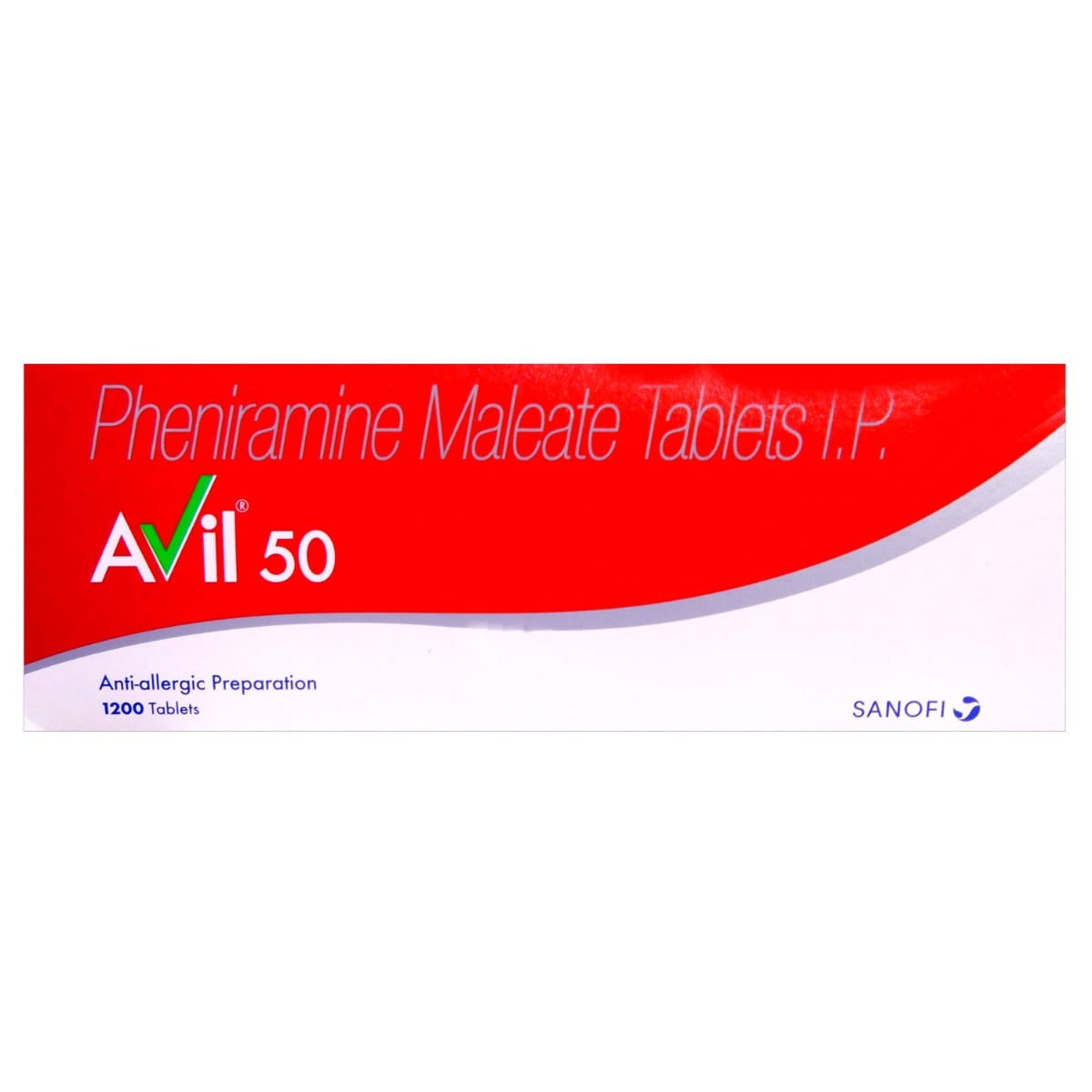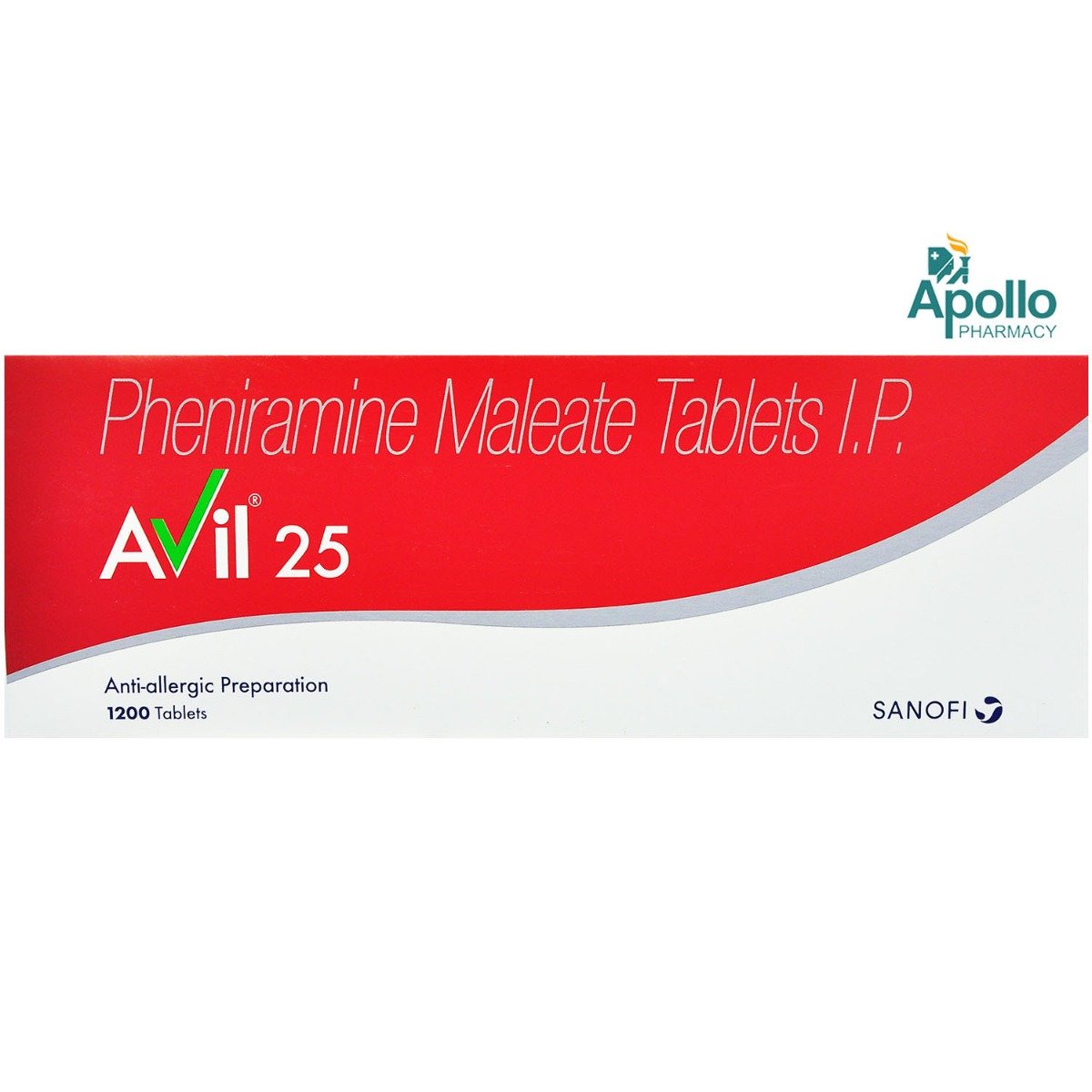Pheniramine Maleate
About Pheniramine Maleate
Pheniramine Maleate is used to treat allergic conditions such as hayfever, runny nose, allergic conjunctivitis, vasomotor rhinitis, acute rhinitis, and itching skin conditions. Additionally, Pheniramine Maleate is also used to prevent and treat motion sickness, nausea, vomiting, and vertigo due to Menière's disease and other labyrinthine disturbances.
Pheniramine Maleate contains Pheniramine maleate, which works by blocking the action of a chemical messenger called 'histamine', which is responsible for causing allergic reactions. Thereby Pheniramine Maleate treats allergic conditions.
You are advised to take Pheniramine Maleate for as long as your doctor has prescribed it for you, depending upon your medical condition. In some cases, Pheniramine Maleate may cause side effects, such as drowsiness, dizziness, diarrhoea, stomach pain, and dry mouth. Most of these side effects do not require medical attention and will resolve gradually over time. However, you are advised to talk to your doctor if you experience these side effects persistently.
Do not take Pheniramine Maleate if you are allergic to any of its components. Consult your doctor if you are pregnant or breastfeeding. Pheniramine Maleate may cause drowsiness, so drive or operate machinery only if you are alert. Avoid consuming alcohol while taking Pheniramine Maleate. Pheniramine Maleate is not recommended for children below 5 years. Keep your doctor informed about your health condition and medications to rule out any side effects/interactions.
Uses of Pheniramine Maleate
• Relief from Allergic Rhinitis: Pheniramine Maleate is widely used to manage symptoms of allergic rhinitis, including sneezing, a runny or itchy nose, and itchy eyes.
• Treatment of Skin Allergies: Pheniramine Maleate effectively reduces itching and rashes caused by various skin allergies, providing relief from allergic skin reactions.
• Prevention of Motion Sickness: Pheniramine Maleate can help prevent motion sickness by alleviating symptoms such as nausea and vomiting during travel.
• Alleviating Common Cold Symptoms: Pheniramine Maleate provides temporary relief from common cold symptoms, including nasal congestion and sneezing, ensuring better comfort.
• Support for Insomnia: Due to its sedative properties, Pheniramine Maleate may be used off-label to assist those struggling with sleep disorders, helping them fall asleep more easily.
Medicinal Benefits
Pheniramine Maleate belongs to the class of medications called 'anti-histamine' primarily used to treat allergic conditions, such as hayfever, runny nose, allergic conjunctivitis, rashes, serum sickness, food allergy, vasomotor rhinitis, acute rhinitis, and itching skin conditions, such as neurodermatitis, eczema, lichen planus, urticaria, pruritis, and radiation sickness. Additionally, Pheniramine Maleate is also used to prevent and treat motion sickness, nausea, vomiting, and vertigo due to Menière's disease and other labyrinthine disturbances. Pheniramine Maleate contains Pheniramine maleate, which works by blocking the action of a chemical messenger called 'histamine', which is responsible for causing allergic reactions. Thereby Pheniramine Maleate treats allergic conditions.
Directions for Use
- Pheniramine Maleate should be taken with or soon after food.
- Your doctor will decide the dose and duration, depending on the severity of your symptoms.
- Swallow the medicine as a whole with a glass of water.
- Do not crush, chew, or break the medicine, as it may affect the way the medication is absorbed.
Storage
Side Effects of Pheniramine Maleate
- Drowsiness
- Dizziness
- Diarrhoea
- Stomach pain
- Dry mouth
Drug Warnings
Do not take Pheniramine Maleate if you are allergic to any of its components, if you have prostatic hypertrophy (prostate gland enlargement), or if you are taking MAO inhibitors. Inform your doctor if you have narrow-angle glaucoma, asthma, severe cardiovascular disease, kidney or liver problems. Consult your doctor if you are pregnant or breastfeeding. Pheniramine Maleate may cause drowsiness, so drive or operate machinery only if you are alert. Pheniramine Maleate is not recommended for children below 5 years, newborns and premature infants. The anti-emetic effect of Pheniramine Maleate may mask the signs of other conditions; therefore, keep your doctor informed about your medical history.
Drug Interactions
Drug-Drug Interaction: Inform the doctor if you are taking MAO inhibitors, CNS depressants, or anticholinergic (atropine).
Drug-Food Interaction: No interactions were found/established.
Drug-Disease Interaction: Inform the doctor if you have an enlarged prostate, narrow-angle glaucoma, asthma or severe cardiovascular diseases.
Drug-Drug Interactions Checker List:
Safety Advice

Alcohol
cautionAvoid alcohol consumption while on treatment with Pheniramine Maleate.

Pregnancy
cautionPlease consult your doctor if you are pregnant or planning for pregnancy. Your doctor will prescribe only if the benefits outweigh the risks.

Breast Feeding
cautionIt is not known if Pheniramine Maleate passes into breast milk. Please consult your doctor if you are breastfeeding. Your doctor will prescribe only if the benefits outweigh the risks.

Driving
cautionPheniramine Maleate may cause dizziness and drowsiness. Do not drive or operate machinery if you experience these symptoms.

Liver
cautionDose adjustment may be needed. Please consult your doctor if you have liver impairment/problems before starting Pheniramine Maleate.

Kidney
cautionPlease consult your doctor if you have kidney impairment before starting Pheniramine Maleate.

Children
cautionPheniramine Maleate is not recommended for children below 5 years. Pheniramine Maleate should be given to children above 5 years only if advised by the doctor.
Habit Forming
Diet & Lifestyle Advise
Exercise regularly, meditate, do deep breathing, and try progressive muscle relaxation techniques to relieve stress.
Rest well; get optimum sleep.
It is advised to avoid contact with known allergens (allergy-causing agents) such as pollen, dust, etc.
Maintain personal hygiene and keep your surroundings clean.
Special Advise
Pheniramine Maleate has the potential for abuse due to CNS (central nervous system) stimulating effects of antihistamines. Therefore take Pheniramine Maleate only as prescribed by the doctor.
Patients Concern
Disease/Condition Glossary
Allergy: An allergy is a condition in which the immune system reacts abnormally to foreign substances, such as pollen, dust mites, mould spores, food, pet dander, insect stings, and medicines/drugs. The common types of allergies include drug allergy, food allergy, contact dermatitis, latex allergy, allergic asthma, seasonal allergy, animal allergy, and anaphylaxis (severe allergy). Symptoms can range from mild rashes, hives, itching, watery eyes/nose, or runny nose to severe allergic reactions, which could be life-threatening.
Motion/travel sickness: Motion/travel sickness is feeling sick while travelling. It is the disturbance of the inner ear caused by repetitive motion from a vehicle or any other movement that disturbs the inner ear. Symptoms include vomiting, nausea, and dizziness.
Meniere's disease: It is an inner ear disorder that causes episodes of vertigo (spinning sensation), which could lead to severe nausea and imbalance. Symptoms include vertigo, hearing loss, tinnitus (ringing sound in the ear), and ear pressure.
FAQs
Pheniramine Maleate is used to treat allergic conditions such as hay fever, runny nose, allergic conjunctivitis, vasomotor rhinitis, acute rhinitis, and itching skin conditions. Additionally, it is also used to prevent and treat motion sickness, nausea, vomiting, and vertigo due to Menière's disease and other labyrinthine disturbances.
Pheniramine Maleate works by blocking the action of a chemical messenger called 'histamine' responsible for causing allergic reactions. Thereby Pheniramine Maleate treats allergic conditions.
Limiting caffeine intake, avoiding smoking and mouthwashes containing alcohol, drinking water regularly, and chewing sugar-free gum/candy might help stimulate saliva and thereby prevent drying of the mouth.
To treat your condition effectually, continue taking Pheniramine Maleate for as long as your doctor has prescribed it. However, if you experience any difficulty while taking Pheniramine Maleate, please consult your doctor.
Pheniramine Maleate may cause diarrhoea. Drink plenty of fluids and eat non-spicy food if you have diarrhoea. However, if the condition persists or worsens, consult a doctor.
MAO inhibitors may prolong and intensify the effect of Pheniramine Maleate. Therefore, do not take Pheniramine Maleate with MAO inhibitors (drugs used to treat depression). Consult your doctor if you have any concerns.






